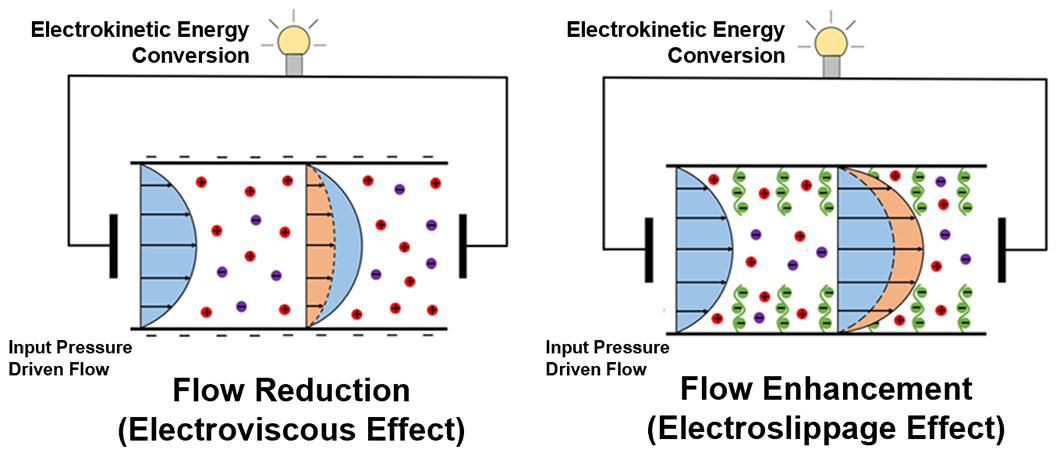Das publishes new work in ACS Nano
Nanochannels—miniature tubes that can be functionalized by having polymers or other substances grafted onto them—can generate energy when they transport liquids, but at the cost of reduced flow. Now, however, ACS Nano has published brand-new findings by UMD associate professor of mechanical engineering Siddhartha Das and his research team, showing that under some circumstances it is possible to achieve the best of both worlds: energy generation plus enhanced, rather than attenuated, flow. “It’s a very important finding,” Das said. “Typically, pressure-driven transport in charged nanochannels leads to energy generation and flow reduction. This flow reduction is well-known as the electroviscous effect. Energy is generated due to the creation of an electric field, which in turn drives the flow in a direction opposite to the original flow, causing an overall reduction in the flow rate.” “We showed that in certain cases, flow can actually be enhanced,” Das said. “We refer to this as an electroslippage effect.”
The new paper is the second by Das to be published by ACS Nano, one of the premier journals in the field, during the past year. In the first paper, which appeared in April, Das and his team identified a phenomenon known as “overscreening,” which causes the polyelectrolyte (PE) layer within a functionalized nanochannel to undergo a reversal of electrical charge. Das’s new work builds off of that earlier finding, as he and his team of doctoral students continue to leverage atomic-level simulations in order to investigate the phenomena that can occur when nanochannels are functionalized. “While the body of knowledge concerning functionalized nanochannels is extensive, we’re finding that they have many properties that, until now, have not been recognized or understood,” Das said. “We are making the world rethink decades-old concepts.” The new paper. “Simultaneous Energy Generation and Flow Enhancement (Electroslippage Effect) in Polyelectrolyte Brush Functionalized Nanochannels,” has been published online by ACS Nano ahead of its formal publication date (DOI: 10.1021/acsnano.1c05056). In addition to Das, the authors include Harnoor Singh Sachar. who received his Ph.D. in mechanical engineering at UMD and is currently conducting postdoctoral research at the University of Texas at Austin, as well as current doctoral students Turash Haque Pial; and Vishal Sankar Sivasankar. A member of the UMD mechanical engineering faculty since 2014, Das is a Fellow of the Institute of Physics and also a Fellow of the Royal Society of Chemistry. For more information about his research, contact him at sidd@umd.edu.
Related Articles: October 21, 2021 Prev Next |



 The phenomenon only occurs with certain classes of polymers and ions, he added. The team has used molecular dynamics simulations to identify the precise combinations that are involved.
The phenomenon only occurs with certain classes of polymers and ions, he added. The team has used molecular dynamics simulations to identify the precise combinations that are involved.